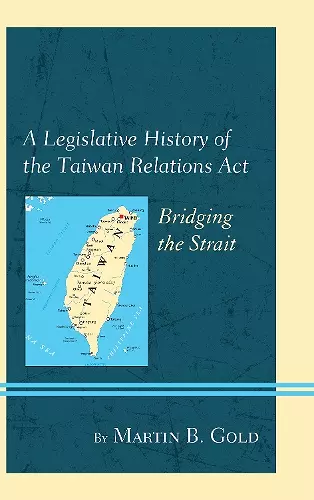A Legislative History of the Taiwan Relations Act
Bridging the Strait
Format:Paperback
Publisher:Lexington Books
Published:31st Aug '18
Currently unavailable, and unfortunately no date known when it will be back
This paperback is available in another edition too:
- Hardback£110.00(9781498511124)

As 1979 dawned, President Jimmy Carter extended diplomatic recognition to the People’s Republic of China. upending longstanding U.S. foreign policy in Asia. For thirty years after the triumph of Mao’s revolution, the United States continued to recognize the claim of the Republic of China, based on Taiwan, to govern the entire country. Intricate economic and cultural relations existed between Washington and Taipei, backed by a Mutual Defense Treaty. While Carter withdrew from the treaty, satisfying a core Chinese condition for diplomatic relations, he presented Congress with legislation to allow other ties with Taiwan to continue unofficially. Many in Congress took issue with the President. Generally supportive of his policy to normalize relations with China, they worried about Taiwan’s future. Believing Carter’s legislation was incomplete, especially regarding Taiwan’s security, they held extensive hearings and lengthy debates, substantially strengthening the bill. The President ensured the measure comported with the terms of normalization. He negotiated with Congress to produce legislation he could sign and Beijing could at least tolerate. Although the final product enjoyed broad consensus in Congress, fights over amendments were fierce, and not always to the President’s advantage. Passage of the Taiwan Relations Act stabilized America’s position in Asia and its situation with Taipei, while allowing the new China to be properly launched. Now in its fourth decade, the Act remains highly impactful on the leading bilateral relationship in the world.The United States Constitution makes Congress the President’s partner in shaping American foreign policy. The Taiwan Relations Act of 1979 vividly demonstrates how robust congressional engagement and inter-Branch cooperation leads to stronger and more durable policy outcomes, which enjoy a greater degree of public acceptance.
In this study, Martin B. Gold provides an extremely accurate assessment of the substantial alterations to the Taiwan legislation put forward by the Carter administration and how the final approval in Congress occurred. This is an excellent historical and procedural study. -- Dennis DeConcini, former U.S. Senator from Arizona
The great sage of Senate rules and procedures offers here a scholarly yet accessible case study of the world’s greatest deliberative body in action. As a participant in the events described, I can attest that Martin B. Gold deftly explores the myriad influences on Congress’s consideration of the Taiwan Relations Act. Of particular importance, Gold thoughtfully assesses the process by which Congress improved the bill, thereby ensuring the long term security of U.S. interests in the Western Pacific. As the contemporary Senate seeks a return to its original purposes, Gold reminds us of a time when policies were crafted and ideas considered based on both particular interests and arguments in favor of the common good. -- Orrin Hatch, U.S. Senator from Utah
ISBN: 9781498511148
Dimensions: 223mm x 151mm x 23mm
Weight: 599g
372 pages